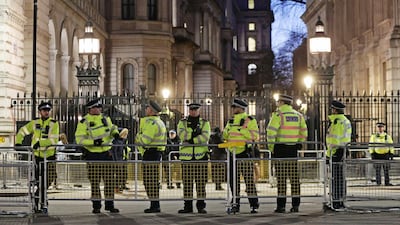The first major overseas trip by Mohammed bin Salman since his elevation to crown prince of Saudi Arabia was quite a talking point.
For a start the London visit was widely billed by opponents as a tempestuous affair that could lead the Saudi leadership to take umbrage against Britain.
A fake narrative was built up to the point of a deluge of disinformation. Expectations were put out that central London would be a scene of a virtual carnage. Campaign groups claimed they would mobilise in the thousands to create a disruptive wall of sound.
As it turned out I have seen more anger targeted at visiting Sri Lankan government ministers than was evident last week. There were protests but these were nothing like in the numbers projected. All the effort of the British police to handle a big problem was redundant.
The failure to mobilise on the streets was notable for one other reason. There has been a concentrated effort within media, legal circles, politics and academia to whip up a maelstrom. Fanning the flames through the protest calls was an unholy alliance of left-wing activists and Qatari-backed organisations.
It is telling that one photograph of a clutch of protesters outside the Houses of Parliament on Wednesday included a woman holding a pro-Qatari banner. At least she revealed her affiliations. Others have been co-opted, including a handful of senior lawyers who have become suspiciously active on regional matters in the months since the Arab Quartet announced a boycott of Doha.
To have eminent Queen's Counsel using Twitter to urge protests against the 32-year old modernising crown prince of a country undergoing rapid reform is a curious phenomenon. Cui bono, who benefits?
The British public was exercised by other news throughout the week. A Russian man and his daughter were fighting for their lives in southern England after a poisoning that could have been orchestrated by the Kremlin.
The prospect that Moscow blatantly tried to kill a man it regards as a traitor in a foreign country is globally significant. Without the incident, there would have been much more focus on Prince Mohammed's visit.
In fact, that was double-edged. There were fewer precooked stories to make a mountain out of the molehill of demonstrations.
The reasonably sophisticated Saudi effort to highlight and explain Prince Mohammed's reform programme was cast in shadows for the same reason. People experiencing the change in lifestyle from Prince Mohammed's reforms showcased their experiences.
When King Abdullah made a state visit in 2007, the major event sponsored by the Saudi Arabian embassy was an exhibition from a photographic archive taken by a British royal on a trip to the region in the 1930s. Princess Alice was indeed a trailblazer. Many of the themes that resonate today were symbolised by that collection compiled a decade ago. The underlying ideas around women's travel and cross-cultural experiences were obvious.
However the display was mounted within the embassy itself and only a very select few with high-level invites were ever exposed to the themes it sought to put across.
Fast forward 10 years and Princess Alice's photographs and details of the trip were incorporated in an exhibition in Mayfair last week. It included Saudi Arabian films, talks, art and cultural festivals. The well-designed event was able to show today's audience why they should engage with country undergoing transformative change.
Mao Zedong, the founder of the People's Republic of China, declared that revolutions were not dinner parties. In other words norms of behaviour go out of the window in transformative times.
The events of last week underline another reality. People are not always mobilised by campaign groups and their preconceived campaigns.
Save the Children, the prominent charity, was among the groups promoting social media advertisements attacking Prince Mohammed. This crossed an advocacy line. On the very same day its chairman, Sir Alan Parker, was hounded out of a monthly board meeting by a woman who was protesting a culture of bullying and tolerance of harassment.
There was also an object lesson in the self-denying tendency of policy makers to shy away from hosting leading statesmen because of fears of protests.
Time and again the plans to march to the barricades pointlessly take up much of the oxygen in the preparations for visits. Diplomatic opportunities are lost because high risk ideas are shunted into the too-difficult category.
The visit of Prince Mohammed demonstrated the virtue in pressing on regardless. It faced down the circular firing squad of rumour mongers. It showed that engagement was possible across a range of backgrounds despite concocted pressures.
The lost opportunity of hosting President Donald Trump in Britain must now be revived as an act of British foreign policy positioning.
Fortune follows the brave not those who are scared of the shadows cast by professional protesters.

